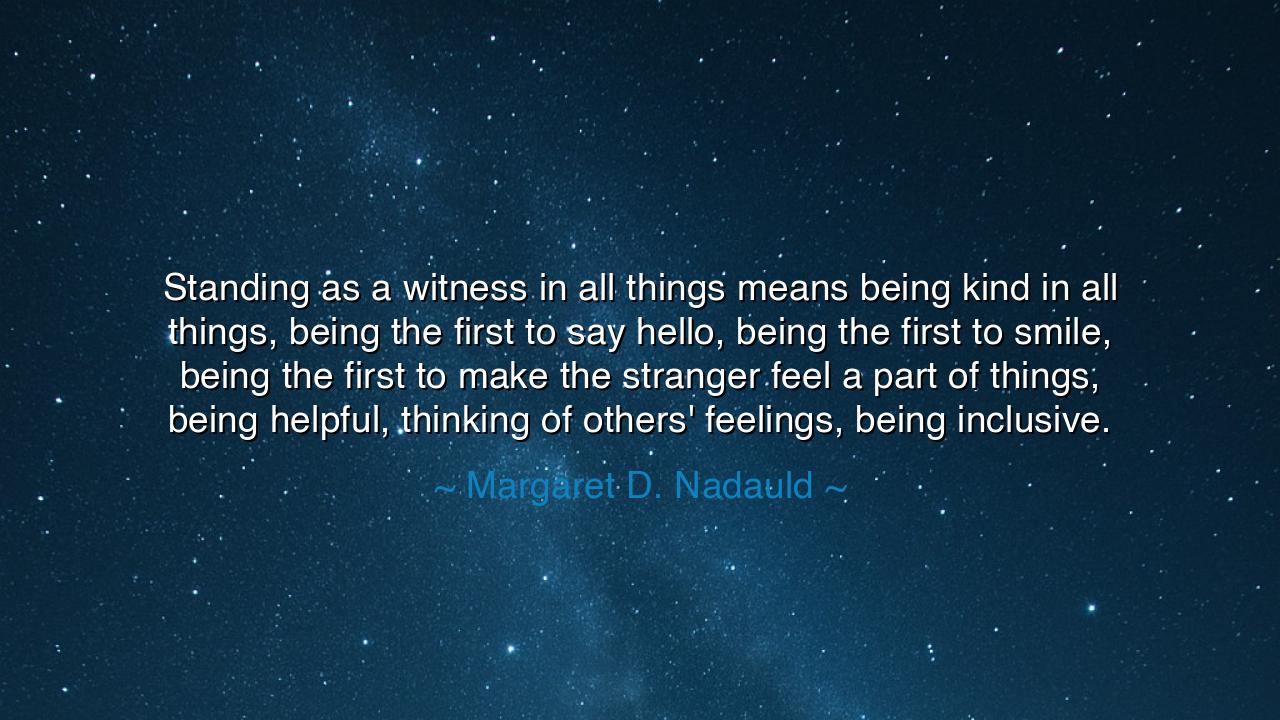
Standing as a witness in all things means being kind in all
Standing as a witness in all things means being kind in all things, being the first to say hello, being the first to smile, being the first to make the stranger feel a part of things, being helpful, thinking of others' feelings, being inclusive.






Hear now the words of Margaret D. Nadauld, whose voice echoes with wisdom: “Standing as a witness in all things means being kind in all things, being the first to say hello, being the first to smile, being the first to make the stranger feel a part of things, being helpful, thinking of others’ feelings, being inclusive.” This saying is not a mere arrangement of gentle words; it is a summons to the heart, a call to live with courage, humility, and unwavering compassion. It teaches that to witness is not only to observe, but to embody goodness— to bear testimony with one’s very life.
In the days of the ancients, to “stand as a witness” was to carry the weight of honor and truth before men and gods alike. It was to live in such a way that every act was a testament to unseen truths. Nadauld rekindles this ancient fire, reminding us that in a world often ruled by indifference, to be kind in all things is to become a living beacon. The smile offered before one is returned, the hand extended before it is asked, these are not small gestures; they are mighty in their quiet power.
Consider the story of Abraham Lincoln in his youth. It is told that he once walked miles in the dead of night to return a few pennies he had overcharged a customer. To some, it was trivial; to him, it was the essence of integrity. He bore witness to fairness, to honesty, and to the dignity of others, even when no one else was watching. In the same way, when Nadauld exhorts us to be the first to greet, to smile, to lift others, she speaks of small seeds whose harvest is a forest of trust and love.
The wisdom of this teaching also stirs our memory of the saints, sages, and leaders who made inclusiveness their shield and banner. Recall the words of Christ: “Inasmuch as ye have done it unto one of the least of these my brethren, ye have done it unto me.” To embrace the stranger is to embrace the Divine hidden in another’s form. To think of another’s feelings is to place ourselves in harmony with the eternal rhythm of compassion.
Yet let us not mistake kindness for weakness. To be first in kindness requires courage greater than the courage of the sword. For the sword conquers bodies, but kindness conquers hearts. To smile when the world scorns, to include the one who is forgotten, to honor the feelings of even the least—this is the bravery of the soul. It is heroic in the deepest sense, for it calls us to fight not against enemies, but against our own selfishness and pride.
From this teaching arises a lesson both timeless and urgent: each day grants us countless moments in which to witness truth by our actions. The question is not whether such moments will come, but whether we will rise to meet them. Will we leave strangers in silence, or will we be the first to bridge the gulf with kindness? Will we ignore the one left out, or will we draw them near? Our lives whisper answers to these questions long before our mouths can speak them.
And so, beloved reader, take from this the call to action: be first in kindness. Let your smile be a herald of peace. Let your greetings mend the walls between souls. Look with eyes that see the lonely, listen with ears that hear the unspoken, act with hands that hasten to help. In such ways you will not only stand as a witness—you will become the testimony itself. And the generations who follow will say of you: here walked one who bore witness in all things, not with words alone, but with a life ablaze in kindness.






AAdministratorAdministrator
Welcome, honored guests. Please leave a comment, we will respond soon